Strategies for Managing Expatriates in Global Business Operations
VerifiedAdded on 2021/06/14
|13
|3550
|65
Essay
AI Summary
This essay examines the role of expatriates in the global business environment, focusing on how multinational companies utilize them to achieve international market success. It explores the importance of effective management strategies, including recruitment, training, adjustment, and repatriation. The essay highlights the challenges expatriates face, such as cultural differences and adjustment issues, and discusses various techniques for managing them effectively. It emphasizes the need for cross-cultural training, language skills, and family support to ensure the success of expatriate assignments and the overall growth of the multinational companies in the global market. The study also provides insights on the factors that influence expatriate adjustment, loyalty, and performance, ultimately providing a comprehensive overview of the expatriate's role in the global business landscape.
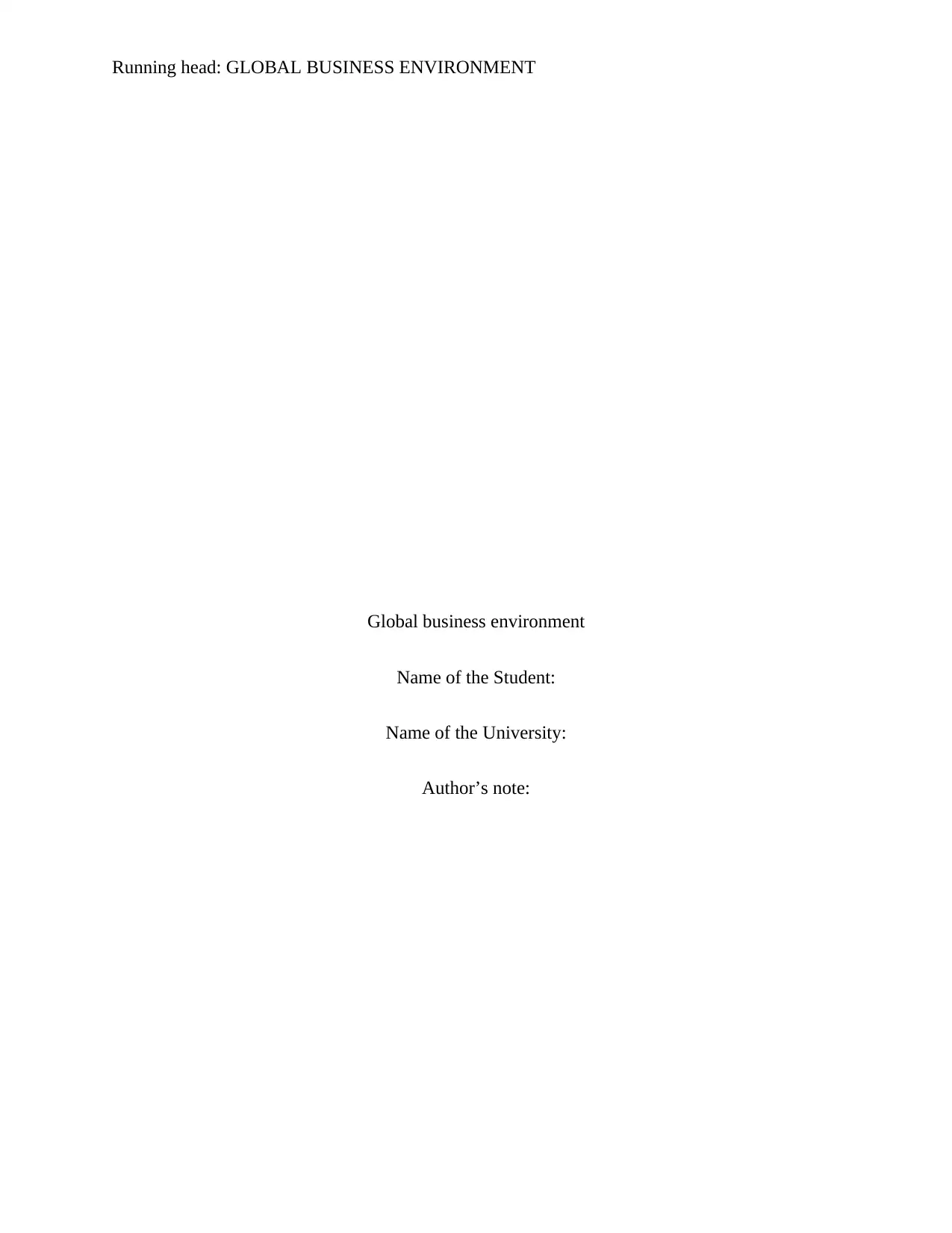
Running head: GLOBAL BUSINESS ENVIRONMENT
Global business environment
Name of the Student:
Name of the University:
Author’s note:
Global business environment
Name of the Student:
Name of the University:
Author’s note:
Paraphrase This Document
Need a fresh take? Get an instant paraphrase of this document with our AI Paraphraser
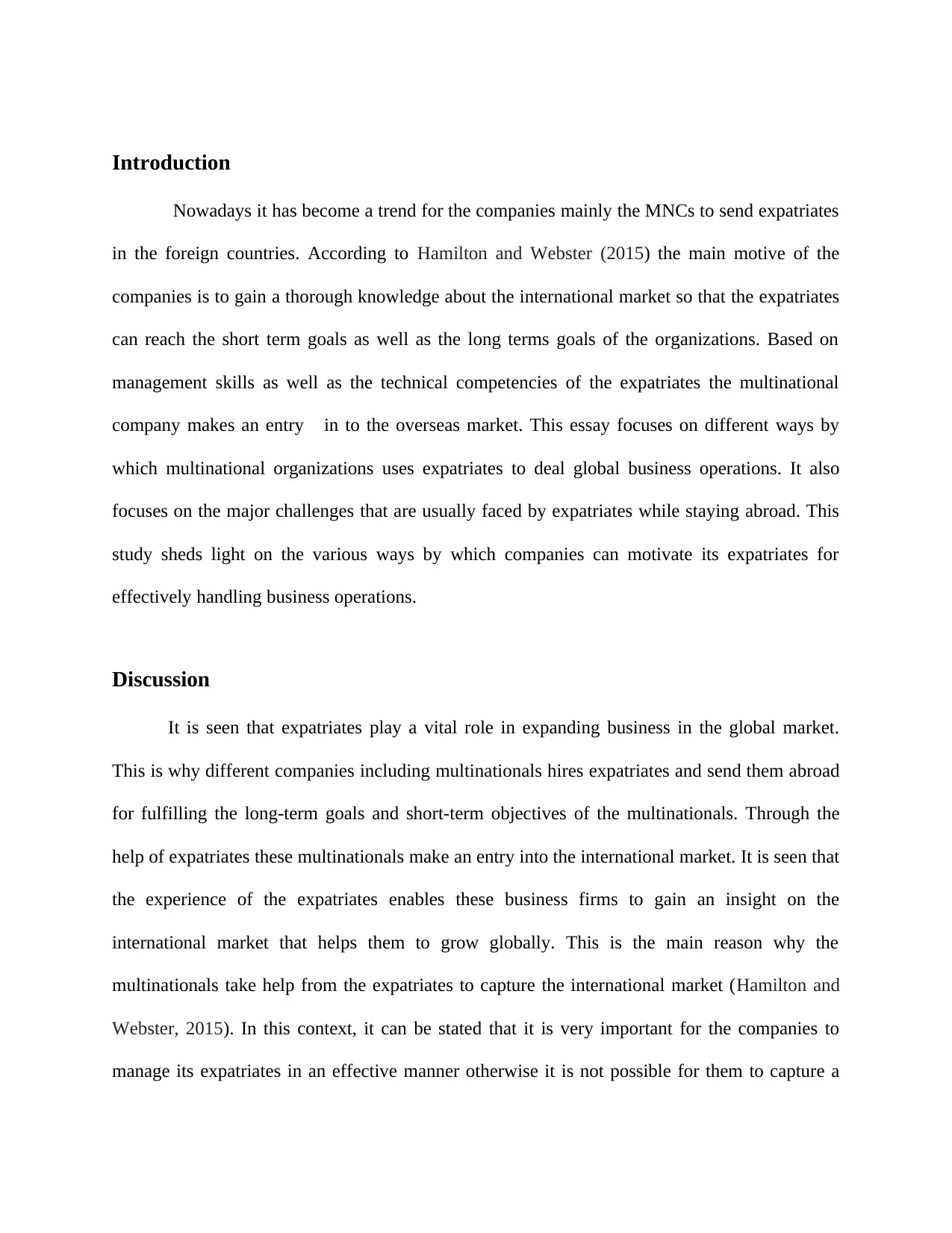
Introduction
Nowadays it has become a trend for the companies mainly the MNCs to send expatriates
in the foreign countries. According to Hamilton and Webster (2015) the main motive of the
companies is to gain a thorough knowledge about the international market so that the expatriates
can reach the short term goals as well as the long terms goals of the organizations. Based on
management skills as well as the technical competencies of the expatriates the multinational
company makes an entry in to the overseas market. This essay focuses on different ways by
which multinational organizations uses expatriates to deal global business operations. It also
focuses on the major challenges that are usually faced by expatriates while staying abroad. This
study sheds light on the various ways by which companies can motivate its expatriates for
effectively handling business operations.
Discussion
It is seen that expatriates play a vital role in expanding business in the global market.
This is why different companies including multinationals hires expatriates and send them abroad
for fulfilling the long-term goals and short-term objectives of the multinationals. Through the
help of expatriates these multinationals make an entry into the international market. It is seen that
the experience of the expatriates enables these business firms to gain an insight on the
international market that helps them to grow globally. This is the main reason why the
multinationals take help from the expatriates to capture the international market (Hamilton and
Webster, 2015). In this context, it can be stated that it is very important for the companies to
manage its expatriates in an effective manner otherwise it is not possible for them to capture a
Nowadays it has become a trend for the companies mainly the MNCs to send expatriates
in the foreign countries. According to Hamilton and Webster (2015) the main motive of the
companies is to gain a thorough knowledge about the international market so that the expatriates
can reach the short term goals as well as the long terms goals of the organizations. Based on
management skills as well as the technical competencies of the expatriates the multinational
company makes an entry in to the overseas market. This essay focuses on different ways by
which multinational organizations uses expatriates to deal global business operations. It also
focuses on the major challenges that are usually faced by expatriates while staying abroad. This
study sheds light on the various ways by which companies can motivate its expatriates for
effectively handling business operations.
Discussion
It is seen that expatriates play a vital role in expanding business in the global market.
This is why different companies including multinationals hires expatriates and send them abroad
for fulfilling the long-term goals and short-term objectives of the multinationals. Through the
help of expatriates these multinationals make an entry into the international market. It is seen that
the experience of the expatriates enables these business firms to gain an insight on the
international market that helps them to grow globally. This is the main reason why the
multinationals take help from the expatriates to capture the international market (Hamilton and
Webster, 2015). In this context, it can be stated that it is very important for the companies to
manage its expatriates in an effective manner otherwise it is not possible for them to capture a
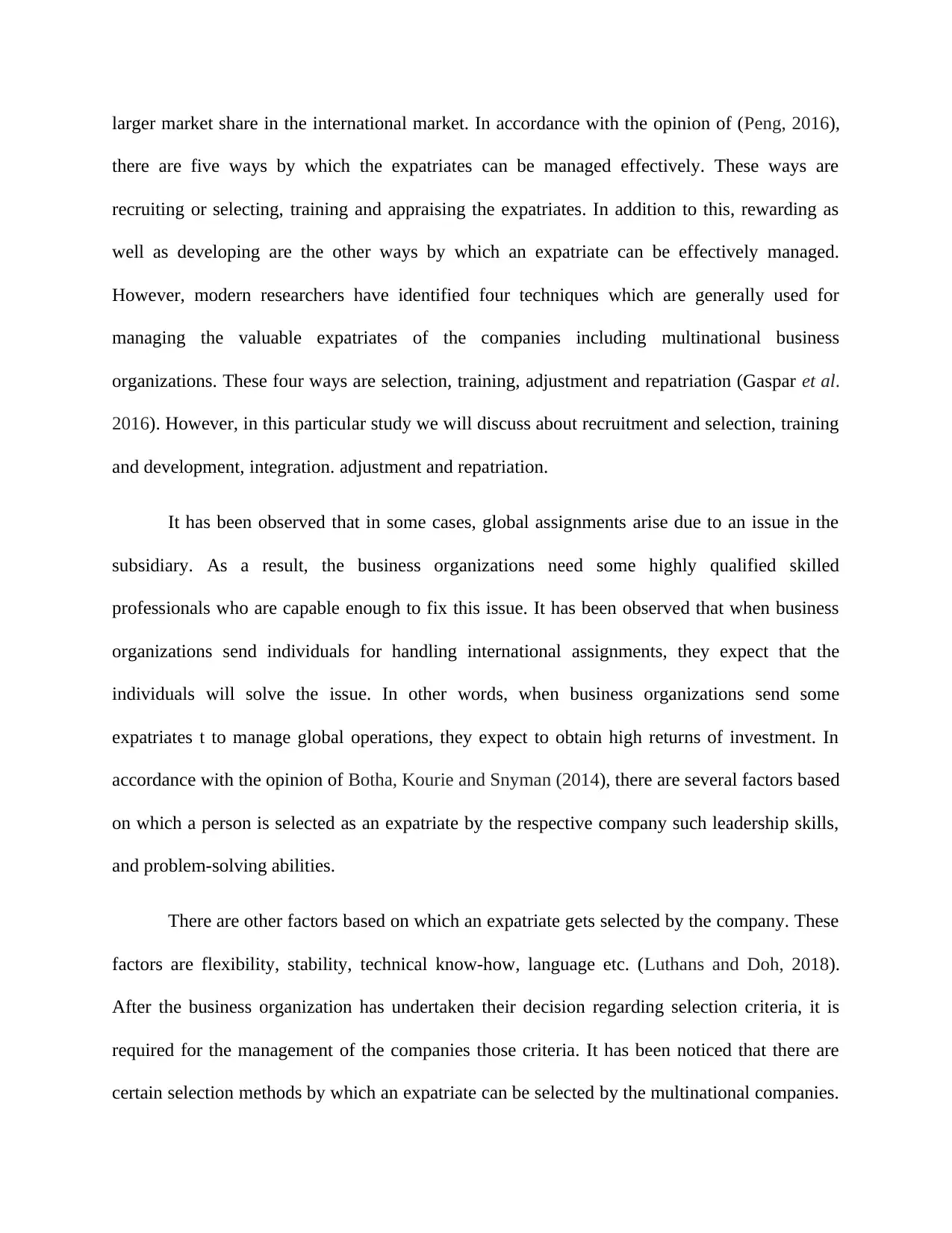
larger market share in the international market. In accordance with the opinion of (Peng, 2016),
there are five ways by which the expatriates can be managed effectively. These ways are
recruiting or selecting, training and appraising the expatriates. In addition to this, rewarding as
well as developing are the other ways by which an expatriate can be effectively managed.
However, modern researchers have identified four techniques which are generally used for
managing the valuable expatriates of the companies including multinational business
organizations. These four ways are selection, training, adjustment and repatriation (Gaspar et al.
2016). However, in this particular study we will discuss about recruitment and selection, training
and development, integration. adjustment and repatriation.
It has been observed that in some cases, global assignments arise due to an issue in the
subsidiary. As a result, the business organizations need some highly qualified skilled
professionals who are capable enough to fix this issue. It has been observed that when business
organizations send individuals for handling international assignments, they expect that the
individuals will solve the issue. In other words, when business organizations send some
expatriates t to manage global operations, they expect to obtain high returns of investment. In
accordance with the opinion of Botha, Kourie and Snyman (2014), there are several factors based
on which a person is selected as an expatriate by the respective company such leadership skills,
and problem-solving abilities.
There are other factors based on which an expatriate gets selected by the company. These
factors are flexibility, stability, technical know-how, language etc. (Luthans and Doh, 2018).
After the business organization has undertaken their decision regarding selection criteria, it is
required for the management of the companies those criteria. It has been noticed that there are
certain selection methods by which an expatriate can be selected by the multinational companies.
there are five ways by which the expatriates can be managed effectively. These ways are
recruiting or selecting, training and appraising the expatriates. In addition to this, rewarding as
well as developing are the other ways by which an expatriate can be effectively managed.
However, modern researchers have identified four techniques which are generally used for
managing the valuable expatriates of the companies including multinational business
organizations. These four ways are selection, training, adjustment and repatriation (Gaspar et al.
2016). However, in this particular study we will discuss about recruitment and selection, training
and development, integration. adjustment and repatriation.
It has been observed that in some cases, global assignments arise due to an issue in the
subsidiary. As a result, the business organizations need some highly qualified skilled
professionals who are capable enough to fix this issue. It has been observed that when business
organizations send individuals for handling international assignments, they expect that the
individuals will solve the issue. In other words, when business organizations send some
expatriates t to manage global operations, they expect to obtain high returns of investment. In
accordance with the opinion of Botha, Kourie and Snyman (2014), there are several factors based
on which a person is selected as an expatriate by the respective company such leadership skills,
and problem-solving abilities.
There are other factors based on which an expatriate gets selected by the company. These
factors are flexibility, stability, technical know-how, language etc. (Luthans and Doh, 2018).
After the business organization has undertaken their decision regarding selection criteria, it is
required for the management of the companies those criteria. It has been noticed that there are
certain selection methods by which an expatriate can be selected by the multinational companies.
⊘ This is a preview!⊘
Do you want full access?
Subscribe today to unlock all pages.

Trusted by 1+ million students worldwide
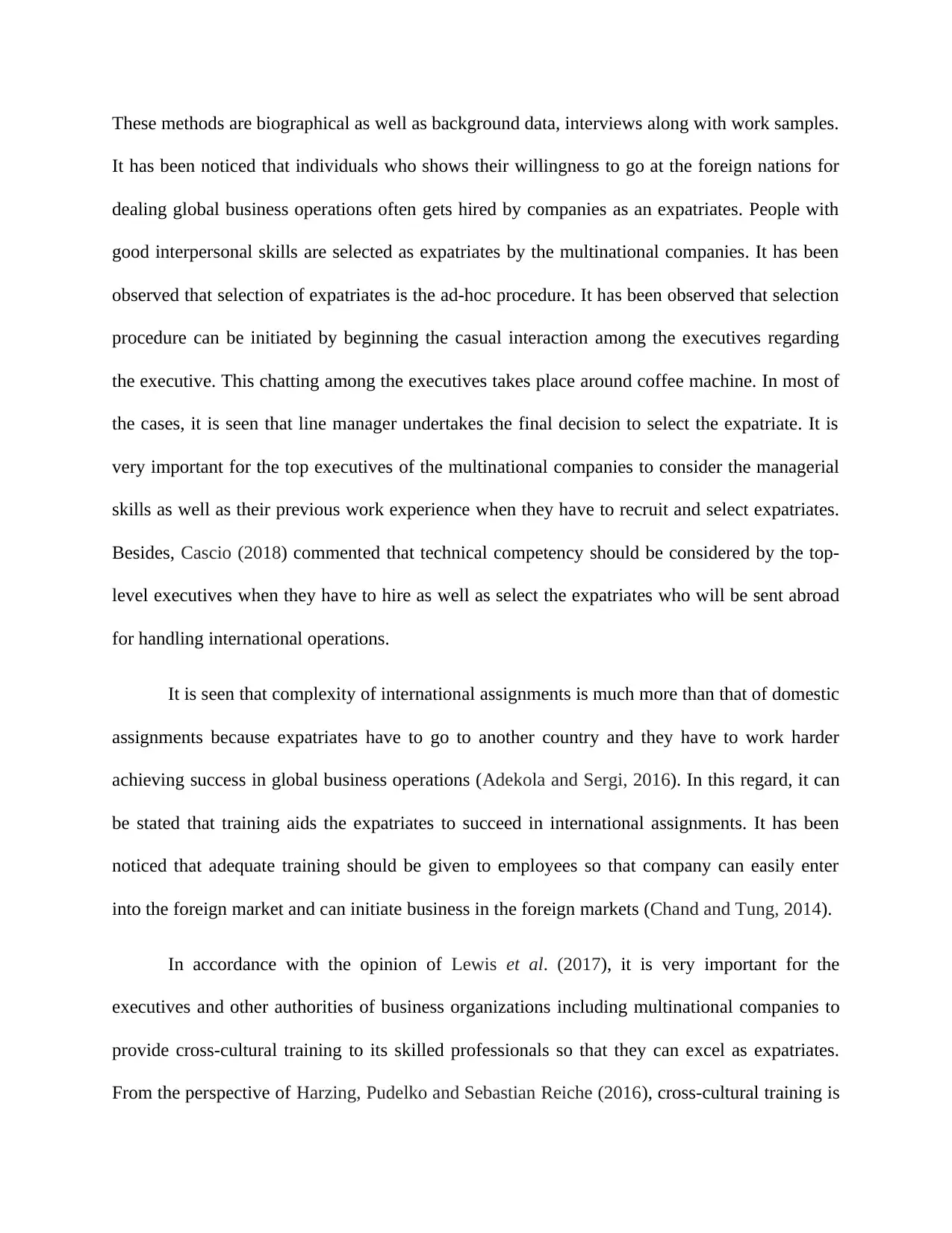
These methods are biographical as well as background data, interviews along with work samples.
It has been noticed that individuals who shows their willingness to go at the foreign nations for
dealing global business operations often gets hired by companies as an expatriates. People with
good interpersonal skills are selected as expatriates by the multinational companies. It has been
observed that selection of expatriates is the ad-hoc procedure. It has been observed that selection
procedure can be initiated by beginning the casual interaction among the executives regarding
the executive. This chatting among the executives takes place around coffee machine. In most of
the cases, it is seen that line manager undertakes the final decision to select the expatriate. It is
very important for the top executives of the multinational companies to consider the managerial
skills as well as their previous work experience when they have to recruit and select expatriates.
Besides, Cascio (2018) commented that technical competency should be considered by the top-
level executives when they have to hire as well as select the expatriates who will be sent abroad
for handling international operations.
It is seen that complexity of international assignments is much more than that of domestic
assignments because expatriates have to go to another country and they have to work harder
achieving success in global business operations (Adekola and Sergi, 2016). In this regard, it can
be stated that training aids the expatriates to succeed in international assignments. It has been
noticed that adequate training should be given to employees so that company can easily enter
into the foreign market and can initiate business in the foreign markets (Chand and Tung, 2014).
In accordance with the opinion of Lewis et al. (2017), it is very important for the
executives and other authorities of business organizations including multinational companies to
provide cross-cultural training to its skilled professionals so that they can excel as expatriates.
From the perspective of Harzing, Pudelko and Sebastian Reiche (2016), cross-cultural training is
It has been noticed that individuals who shows their willingness to go at the foreign nations for
dealing global business operations often gets hired by companies as an expatriates. People with
good interpersonal skills are selected as expatriates by the multinational companies. It has been
observed that selection of expatriates is the ad-hoc procedure. It has been observed that selection
procedure can be initiated by beginning the casual interaction among the executives regarding
the executive. This chatting among the executives takes place around coffee machine. In most of
the cases, it is seen that line manager undertakes the final decision to select the expatriate. It is
very important for the top executives of the multinational companies to consider the managerial
skills as well as their previous work experience when they have to recruit and select expatriates.
Besides, Cascio (2018) commented that technical competency should be considered by the top-
level executives when they have to hire as well as select the expatriates who will be sent abroad
for handling international operations.
It is seen that complexity of international assignments is much more than that of domestic
assignments because expatriates have to go to another country and they have to work harder
achieving success in global business operations (Adekola and Sergi, 2016). In this regard, it can
be stated that training aids the expatriates to succeed in international assignments. It has been
noticed that adequate training should be given to employees so that company can easily enter
into the foreign market and can initiate business in the foreign markets (Chand and Tung, 2014).
In accordance with the opinion of Lewis et al. (2017), it is very important for the
executives and other authorities of business organizations including multinational companies to
provide cross-cultural training to its skilled professionals so that they can excel as expatriates.
From the perspective of Harzing, Pudelko and Sebastian Reiche (2016), cross-cultural training is
Paraphrase This Document
Need a fresh take? Get an instant paraphrase of this document with our AI Paraphraser
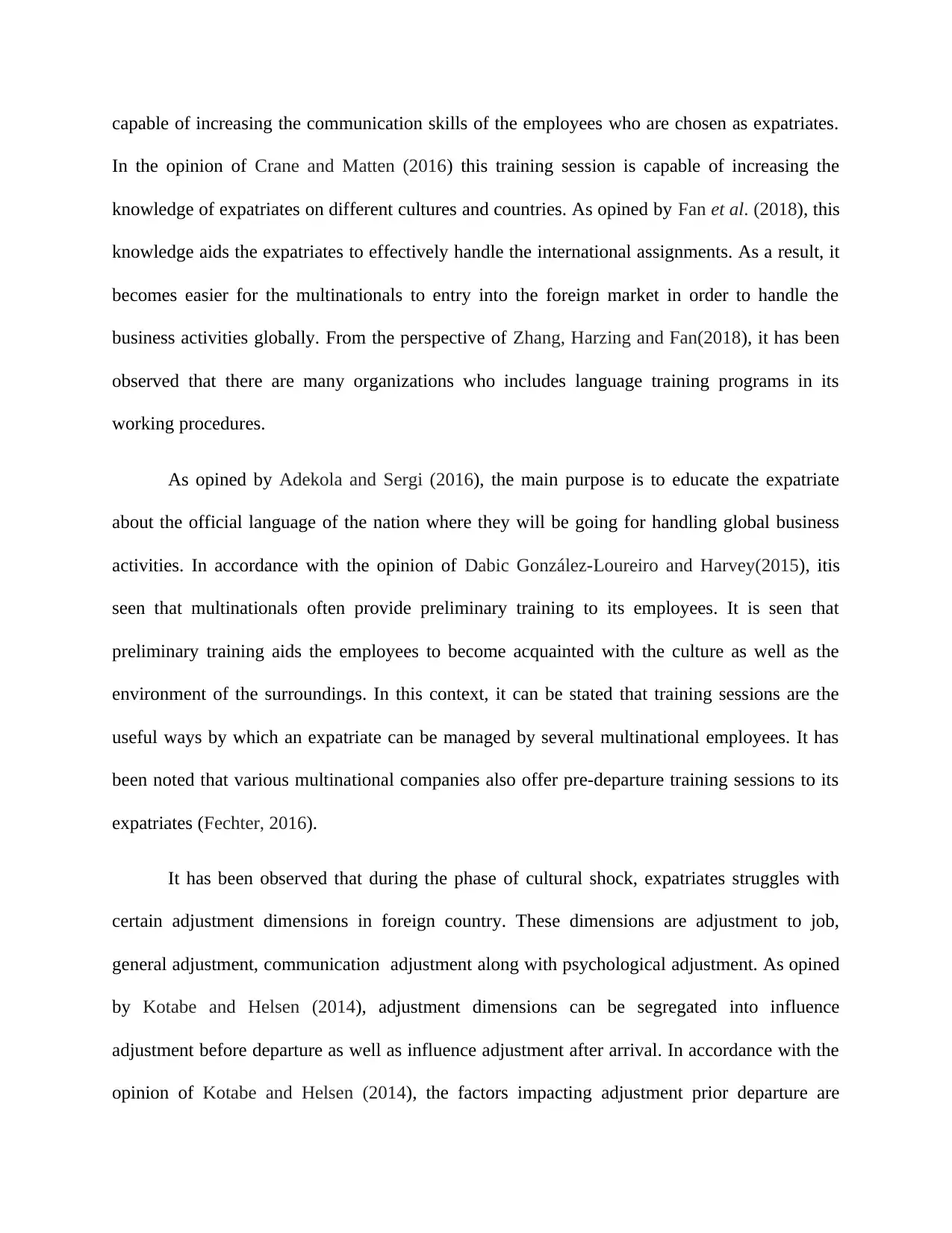
capable of increasing the communication skills of the employees who are chosen as expatriates.
In the opinion of Crane and Matten (2016) this training session is capable of increasing the
knowledge of expatriates on different cultures and countries. As opined by Fan et al. (2018), this
knowledge aids the expatriates to effectively handle the international assignments. As a result, it
becomes easier for the multinationals to entry into the foreign market in order to handle the
business activities globally. From the perspective of Zhang, Harzing and Fan(2018), it has been
observed that there are many organizations who includes language training programs in its
working procedures.
As opined by Adekola and Sergi (2016), the main purpose is to educate the expatriate
about the official language of the nation where they will be going for handling global business
activities. In accordance with the opinion of Dabic González-Loureiro and Harvey(2015), itis
seen that multinationals often provide preliminary training to its employees. It is seen that
preliminary training aids the employees to become acquainted with the culture as well as the
environment of the surroundings. In this context, it can be stated that training sessions are the
useful ways by which an expatriate can be managed by several multinational employees. It has
been noted that various multinational companies also offer pre-departure training sessions to its
expatriates (Fechter, 2016).
It has been observed that during the phase of cultural shock, expatriates struggles with
certain adjustment dimensions in foreign country. These dimensions are adjustment to job,
general adjustment, communication adjustment along with psychological adjustment. As opined
by Kotabe and Helsen (2014), adjustment dimensions can be segregated into influence
adjustment before departure as well as influence adjustment after arrival. In accordance with the
opinion of Kotabe and Helsen (2014), the factors impacting adjustment prior departure are
In the opinion of Crane and Matten (2016) this training session is capable of increasing the
knowledge of expatriates on different cultures and countries. As opined by Fan et al. (2018), this
knowledge aids the expatriates to effectively handle the international assignments. As a result, it
becomes easier for the multinationals to entry into the foreign market in order to handle the
business activities globally. From the perspective of Zhang, Harzing and Fan(2018), it has been
observed that there are many organizations who includes language training programs in its
working procedures.
As opined by Adekola and Sergi (2016), the main purpose is to educate the expatriate
about the official language of the nation where they will be going for handling global business
activities. In accordance with the opinion of Dabic González-Loureiro and Harvey(2015), itis
seen that multinationals often provide preliminary training to its employees. It is seen that
preliminary training aids the employees to become acquainted with the culture as well as the
environment of the surroundings. In this context, it can be stated that training sessions are the
useful ways by which an expatriate can be managed by several multinational employees. It has
been noted that various multinational companies also offer pre-departure training sessions to its
expatriates (Fechter, 2016).
It has been observed that during the phase of cultural shock, expatriates struggles with
certain adjustment dimensions in foreign country. These dimensions are adjustment to job,
general adjustment, communication adjustment along with psychological adjustment. As opined
by Kotabe and Helsen (2014), adjustment dimensions can be segregated into influence
adjustment before departure as well as influence adjustment after arrival. In accordance with the
opinion of Kotabe and Helsen (2014), the factors impacting adjustment prior departure are
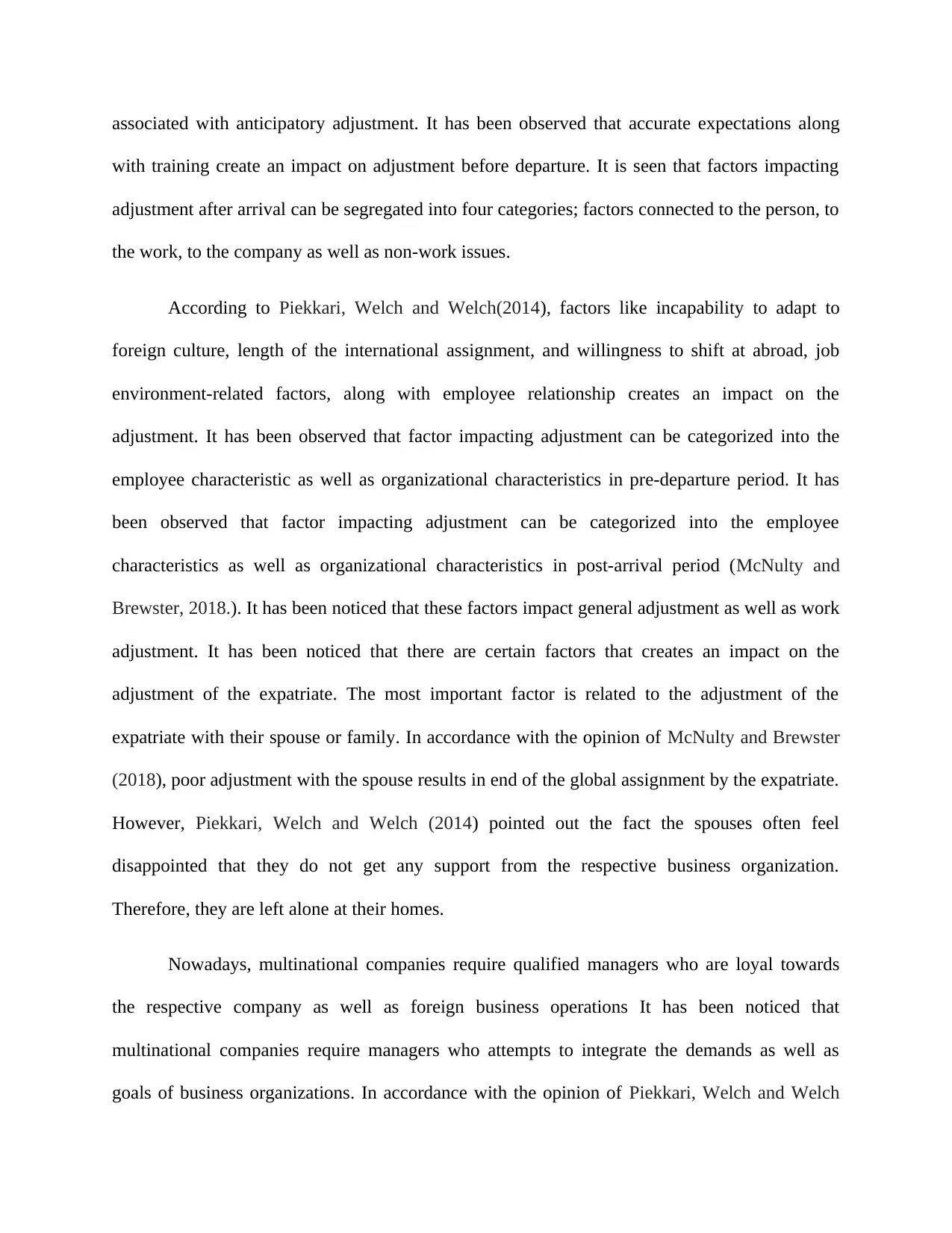
associated with anticipatory adjustment. It has been observed that accurate expectations along
with training create an impact on adjustment before departure. It is seen that factors impacting
adjustment after arrival can be segregated into four categories; factors connected to the person, to
the work, to the company as well as non-work issues.
According to Piekkari, Welch and Welch(2014), factors like incapability to adapt to
foreign culture, length of the international assignment, and willingness to shift at abroad, job
environment-related factors, along with employee relationship creates an impact on the
adjustment. It has been observed that factor impacting adjustment can be categorized into the
employee characteristic as well as organizational characteristics in pre-departure period. It has
been observed that factor impacting adjustment can be categorized into the employee
characteristics as well as organizational characteristics in post-arrival period (McNulty and
Brewster, 2018.). It has been noticed that these factors impact general adjustment as well as work
adjustment. It has been noticed that there are certain factors that creates an impact on the
adjustment of the expatriate. The most important factor is related to the adjustment of the
expatriate with their spouse or family. In accordance with the opinion of McNulty and Brewster
(2018), poor adjustment with the spouse results in end of the global assignment by the expatriate.
However, Piekkari, Welch and Welch (2014) pointed out the fact the spouses often feel
disappointed that they do not get any support from the respective business organization.
Therefore, they are left alone at their homes.
Nowadays, multinational companies require qualified managers who are loyal towards
the respective company as well as foreign business operations It has been noticed that
multinational companies require managers who attempts to integrate the demands as well as
goals of business organizations. In accordance with the opinion of Piekkari, Welch and Welch
with training create an impact on adjustment before departure. It is seen that factors impacting
adjustment after arrival can be segregated into four categories; factors connected to the person, to
the work, to the company as well as non-work issues.
According to Piekkari, Welch and Welch(2014), factors like incapability to adapt to
foreign culture, length of the international assignment, and willingness to shift at abroad, job
environment-related factors, along with employee relationship creates an impact on the
adjustment. It has been observed that factor impacting adjustment can be categorized into the
employee characteristic as well as organizational characteristics in pre-departure period. It has
been observed that factor impacting adjustment can be categorized into the employee
characteristics as well as organizational characteristics in post-arrival period (McNulty and
Brewster, 2018.). It has been noticed that these factors impact general adjustment as well as work
adjustment. It has been noticed that there are certain factors that creates an impact on the
adjustment of the expatriate. The most important factor is related to the adjustment of the
expatriate with their spouse or family. In accordance with the opinion of McNulty and Brewster
(2018), poor adjustment with the spouse results in end of the global assignment by the expatriate.
However, Piekkari, Welch and Welch (2014) pointed out the fact the spouses often feel
disappointed that they do not get any support from the respective business organization.
Therefore, they are left alone at their homes.
Nowadays, multinational companies require qualified managers who are loyal towards
the respective company as well as foreign business operations It has been noticed that
multinational companies require managers who attempts to integrate the demands as well as
goals of business organizations. In accordance with the opinion of Piekkari, Welch and Welch
⊘ This is a preview!⊘
Do you want full access?
Subscribe today to unlock all pages.

Trusted by 1+ million students worldwide
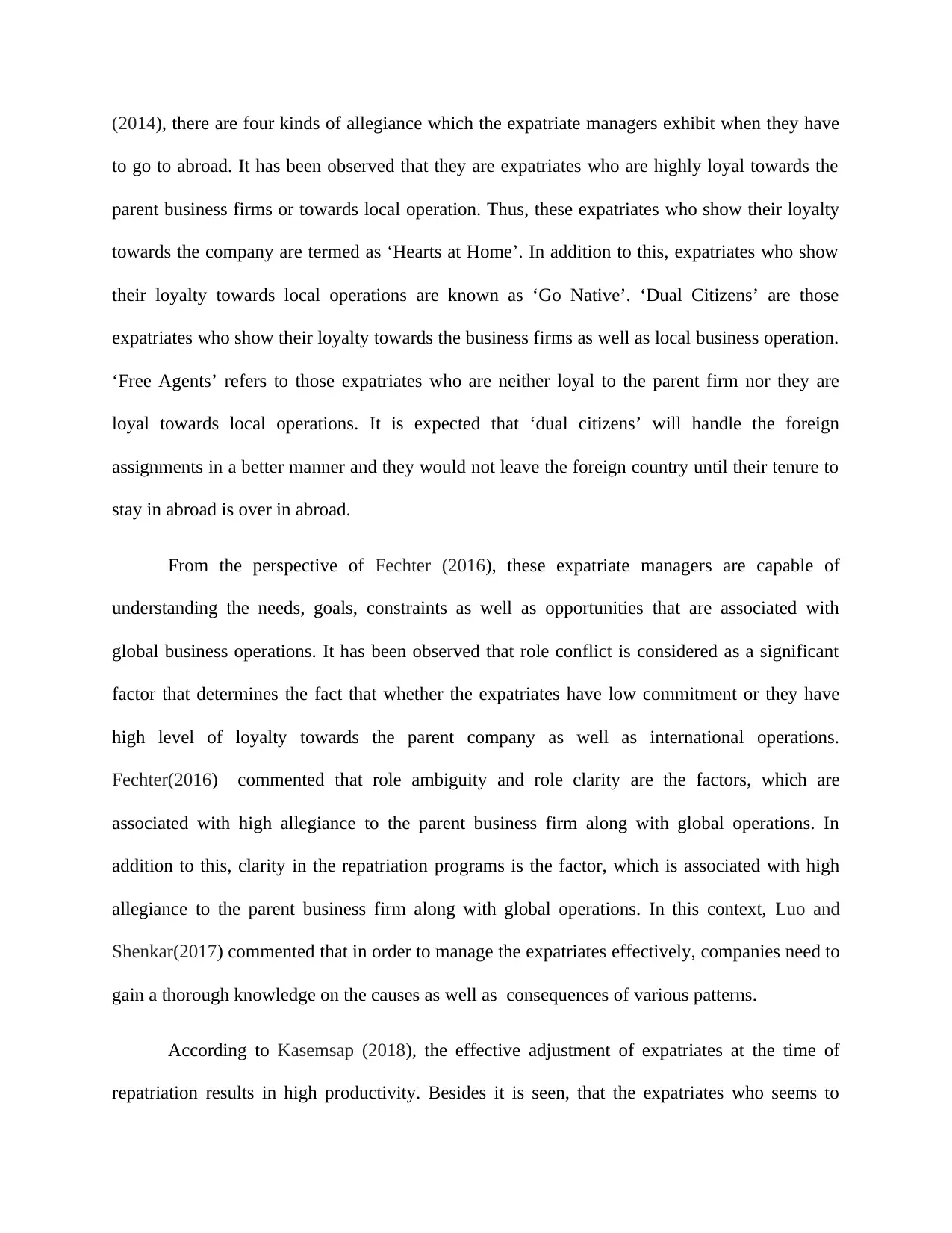
(2014), there are four kinds of allegiance which the expatriate managers exhibit when they have
to go to abroad. It has been observed that they are expatriates who are highly loyal towards the
parent business firms or towards local operation. Thus, these expatriates who show their loyalty
towards the company are termed as ‘Hearts at Home’. In addition to this, expatriates who show
their loyalty towards local operations are known as ‘Go Native’. ‘Dual Citizens’ are those
expatriates who show their loyalty towards the business firms as well as local business operation.
‘Free Agents’ refers to those expatriates who are neither loyal to the parent firm nor they are
loyal towards local operations. It is expected that ‘dual citizens’ will handle the foreign
assignments in a better manner and they would not leave the foreign country until their tenure to
stay in abroad is over in abroad.
From the perspective of Fechter (2016), these expatriate managers are capable of
understanding the needs, goals, constraints as well as opportunities that are associated with
global business operations. It has been observed that role conflict is considered as a significant
factor that determines the fact that whether the expatriates have low commitment or they have
high level of loyalty towards the parent company as well as international operations.
Fechter(2016) commented that role ambiguity and role clarity are the factors, which are
associated with high allegiance to the parent business firm along with global operations. In
addition to this, clarity in the repatriation programs is the factor, which is associated with high
allegiance to the parent business firm along with global operations. In this context, Luo and
Shenkar(2017) commented that in order to manage the expatriates effectively, companies need to
gain a thorough knowledge on the causes as well as consequences of various patterns.
According to Kasemsap (2018), the effective adjustment of expatriates at the time of
repatriation results in high productivity. Besides it is seen, that the expatriates who seems to
to go to abroad. It has been observed that they are expatriates who are highly loyal towards the
parent business firms or towards local operation. Thus, these expatriates who show their loyalty
towards the company are termed as ‘Hearts at Home’. In addition to this, expatriates who show
their loyalty towards local operations are known as ‘Go Native’. ‘Dual Citizens’ are those
expatriates who show their loyalty towards the business firms as well as local business operation.
‘Free Agents’ refers to those expatriates who are neither loyal to the parent firm nor they are
loyal towards local operations. It is expected that ‘dual citizens’ will handle the foreign
assignments in a better manner and they would not leave the foreign country until their tenure to
stay in abroad is over in abroad.
From the perspective of Fechter (2016), these expatriate managers are capable of
understanding the needs, goals, constraints as well as opportunities that are associated with
global business operations. It has been observed that role conflict is considered as a significant
factor that determines the fact that whether the expatriates have low commitment or they have
high level of loyalty towards the parent company as well as international operations.
Fechter(2016) commented that role ambiguity and role clarity are the factors, which are
associated with high allegiance to the parent business firm along with global operations. In
addition to this, clarity in the repatriation programs is the factor, which is associated with high
allegiance to the parent business firm along with global operations. In this context, Luo and
Shenkar(2017) commented that in order to manage the expatriates effectively, companies need to
gain a thorough knowledge on the causes as well as consequences of various patterns.
According to Kasemsap (2018), the effective adjustment of expatriates at the time of
repatriation results in high productivity. Besides it is seen, that the expatriates who seems to
Paraphrase This Document
Need a fresh take? Get an instant paraphrase of this document with our AI Paraphraser
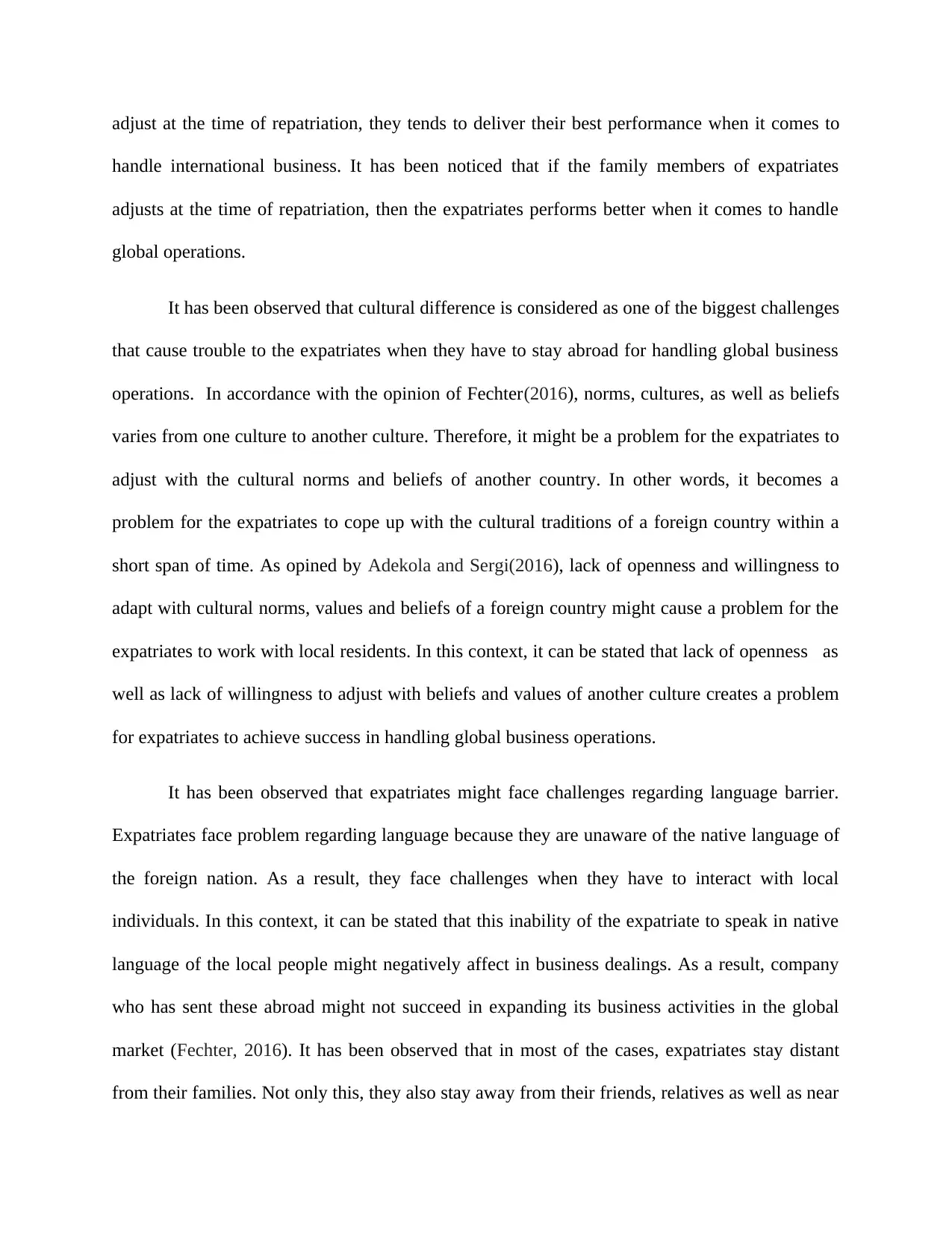
adjust at the time of repatriation, they tends to deliver their best performance when it comes to
handle international business. It has been noticed that if the family members of expatriates
adjusts at the time of repatriation, then the expatriates performs better when it comes to handle
global operations.
It has been observed that cultural difference is considered as one of the biggest challenges
that cause trouble to the expatriates when they have to stay abroad for handling global business
operations. In accordance with the opinion of Fechter(2016), norms, cultures, as well as beliefs
varies from one culture to another culture. Therefore, it might be a problem for the expatriates to
adjust with the cultural norms and beliefs of another country. In other words, it becomes a
problem for the expatriates to cope up with the cultural traditions of a foreign country within a
short span of time. As opined by Adekola and Sergi(2016), lack of openness and willingness to
adapt with cultural norms, values and beliefs of a foreign country might cause a problem for the
expatriates to work with local residents. In this context, it can be stated that lack of openness as
well as lack of willingness to adjust with beliefs and values of another culture creates a problem
for expatriates to achieve success in handling global business operations.
It has been observed that expatriates might face challenges regarding language barrier.
Expatriates face problem regarding language because they are unaware of the native language of
the foreign nation. As a result, they face challenges when they have to interact with local
individuals. In this context, it can be stated that this inability of the expatriate to speak in native
language of the local people might negatively affect in business dealings. As a result, company
who has sent these abroad might not succeed in expanding its business activities in the global
market (Fechter, 2016). It has been observed that in most of the cases, expatriates stay distant
from their families. Not only this, they also stay away from their friends, relatives as well as near
handle international business. It has been noticed that if the family members of expatriates
adjusts at the time of repatriation, then the expatriates performs better when it comes to handle
global operations.
It has been observed that cultural difference is considered as one of the biggest challenges
that cause trouble to the expatriates when they have to stay abroad for handling global business
operations. In accordance with the opinion of Fechter(2016), norms, cultures, as well as beliefs
varies from one culture to another culture. Therefore, it might be a problem for the expatriates to
adjust with the cultural norms and beliefs of another country. In other words, it becomes a
problem for the expatriates to cope up with the cultural traditions of a foreign country within a
short span of time. As opined by Adekola and Sergi(2016), lack of openness and willingness to
adapt with cultural norms, values and beliefs of a foreign country might cause a problem for the
expatriates to work with local residents. In this context, it can be stated that lack of openness as
well as lack of willingness to adjust with beliefs and values of another culture creates a problem
for expatriates to achieve success in handling global business operations.
It has been observed that expatriates might face challenges regarding language barrier.
Expatriates face problem regarding language because they are unaware of the native language of
the foreign nation. As a result, they face challenges when they have to interact with local
individuals. In this context, it can be stated that this inability of the expatriate to speak in native
language of the local people might negatively affect in business dealings. As a result, company
who has sent these abroad might not succeed in expanding its business activities in the global
market (Fechter, 2016). It has been observed that in most of the cases, expatriates stay distant
from their families. Not only this, they also stay away from their friends, relatives as well as near
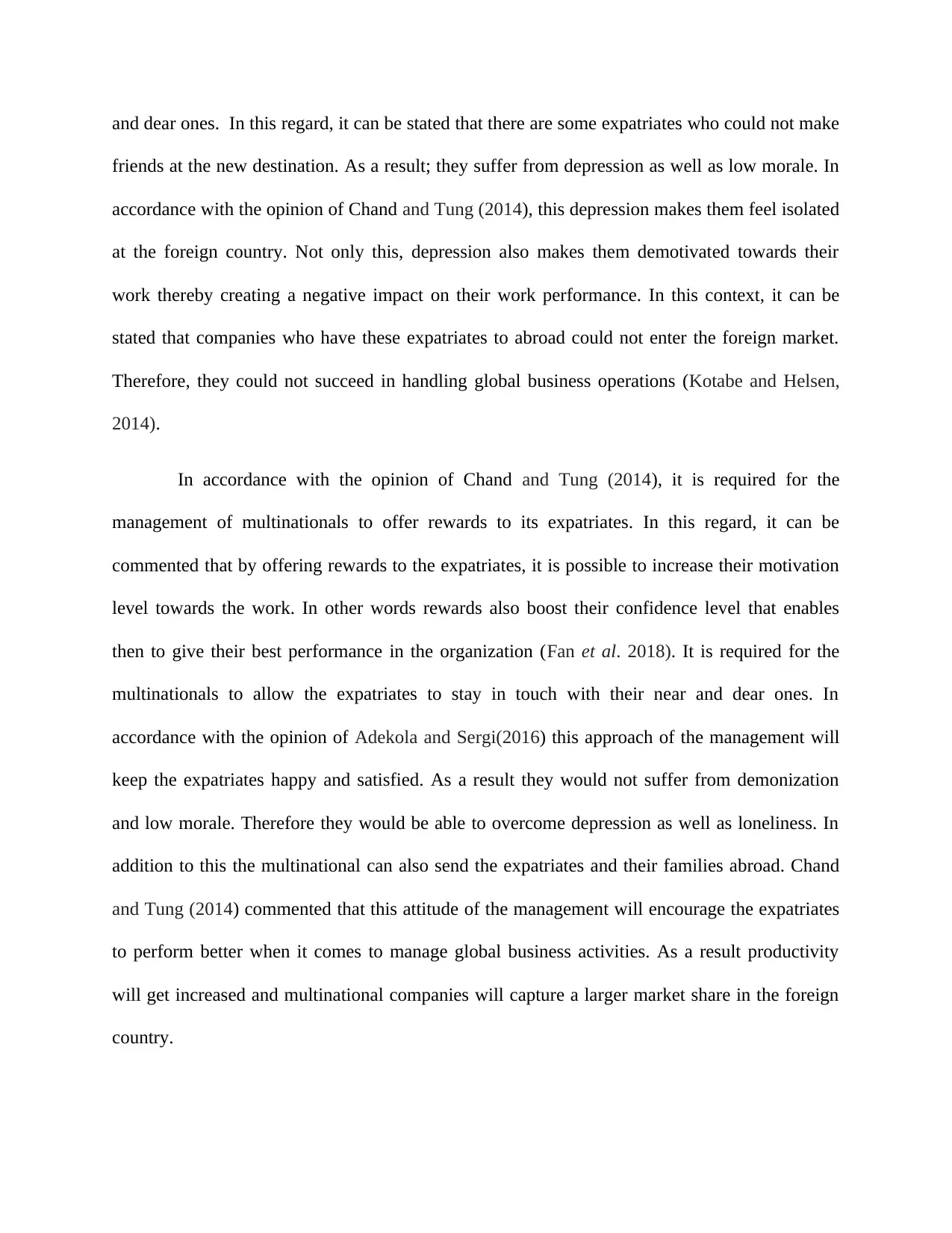
and dear ones. In this regard, it can be stated that there are some expatriates who could not make
friends at the new destination. As a result; they suffer from depression as well as low morale. In
accordance with the opinion of Chand and Tung (2014), this depression makes them feel isolated
at the foreign country. Not only this, depression also makes them demotivated towards their
work thereby creating a negative impact on their work performance. In this context, it can be
stated that companies who have these expatriates to abroad could not enter the foreign market.
Therefore, they could not succeed in handling global business operations (Kotabe and Helsen,
2014).
In accordance with the opinion of Chand and Tung (2014), it is required for the
management of multinationals to offer rewards to its expatriates. In this regard, it can be
commented that by offering rewards to the expatriates, it is possible to increase their motivation
level towards the work. In other words rewards also boost their confidence level that enables
then to give their best performance in the organization (Fan et al. 2018). It is required for the
multinationals to allow the expatriates to stay in touch with their near and dear ones. In
accordance with the opinion of Adekola and Sergi(2016) this approach of the management will
keep the expatriates happy and satisfied. As a result they would not suffer from demonization
and low morale. Therefore they would be able to overcome depression as well as loneliness. In
addition to this the multinational can also send the expatriates and their families abroad. Chand
and Tung (2014) commented that this attitude of the management will encourage the expatriates
to perform better when it comes to manage global business activities. As a result productivity
will get increased and multinational companies will capture a larger market share in the foreign
country.
friends at the new destination. As a result; they suffer from depression as well as low morale. In
accordance with the opinion of Chand and Tung (2014), this depression makes them feel isolated
at the foreign country. Not only this, depression also makes them demotivated towards their
work thereby creating a negative impact on their work performance. In this context, it can be
stated that companies who have these expatriates to abroad could not enter the foreign market.
Therefore, they could not succeed in handling global business operations (Kotabe and Helsen,
2014).
In accordance with the opinion of Chand and Tung (2014), it is required for the
management of multinationals to offer rewards to its expatriates. In this regard, it can be
commented that by offering rewards to the expatriates, it is possible to increase their motivation
level towards the work. In other words rewards also boost their confidence level that enables
then to give their best performance in the organization (Fan et al. 2018). It is required for the
multinationals to allow the expatriates to stay in touch with their near and dear ones. In
accordance with the opinion of Adekola and Sergi(2016) this approach of the management will
keep the expatriates happy and satisfied. As a result they would not suffer from demonization
and low morale. Therefore they would be able to overcome depression as well as loneliness. In
addition to this the multinational can also send the expatriates and their families abroad. Chand
and Tung (2014) commented that this attitude of the management will encourage the expatriates
to perform better when it comes to manage global business activities. As a result productivity
will get increased and multinational companies will capture a larger market share in the foreign
country.
⊘ This is a preview!⊘
Do you want full access?
Subscribe today to unlock all pages.

Trusted by 1+ million students worldwide
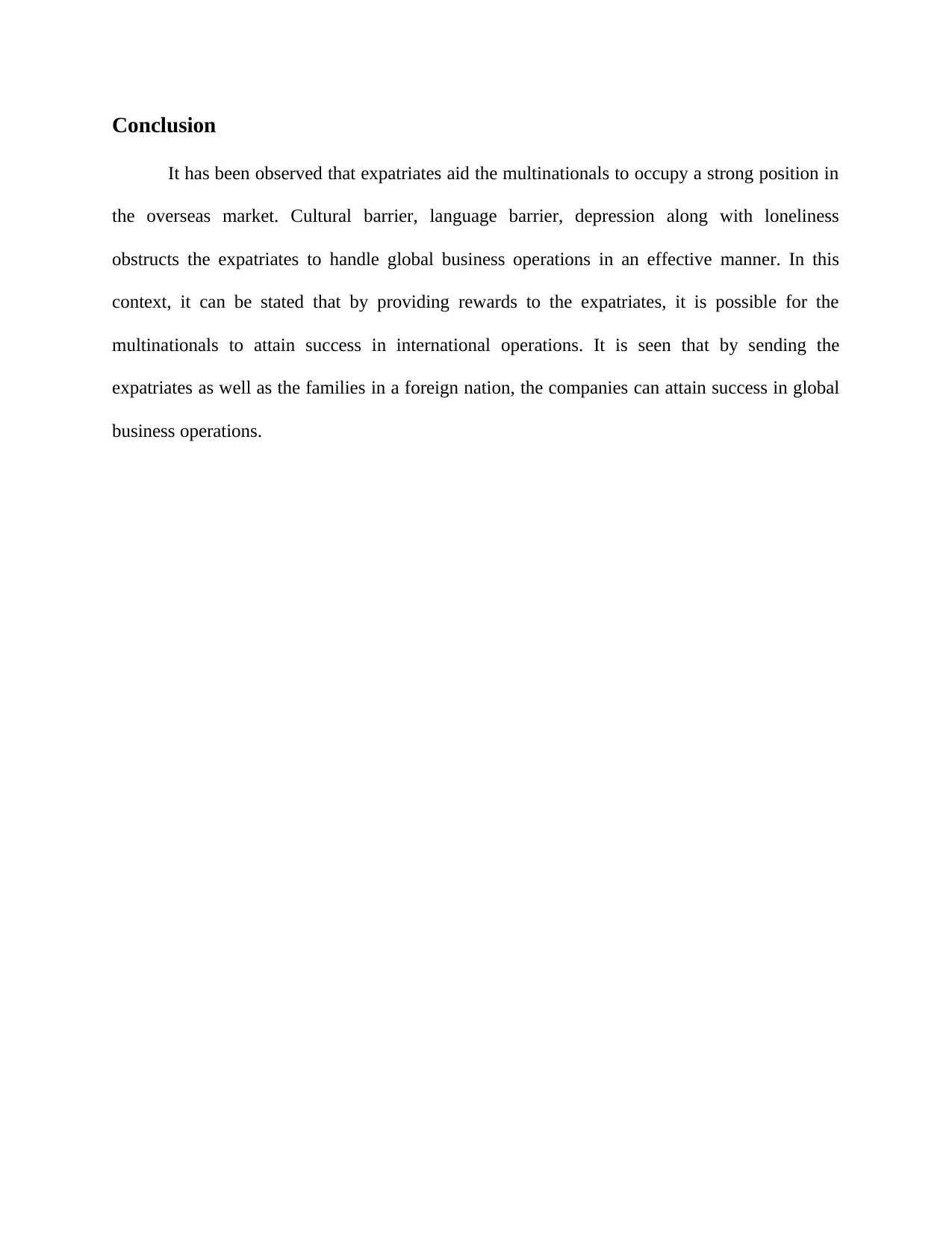
Conclusion
It has been observed that expatriates aid the multinationals to occupy a strong position in
the overseas market. Cultural barrier, language barrier, depression along with loneliness
obstructs the expatriates to handle global business operations in an effective manner. In this
context, it can be stated that by providing rewards to the expatriates, it is possible for the
multinationals to attain success in international operations. It is seen that by sending the
expatriates as well as the families in a foreign nation, the companies can attain success in global
business operations.
It has been observed that expatriates aid the multinationals to occupy a strong position in
the overseas market. Cultural barrier, language barrier, depression along with loneliness
obstructs the expatriates to handle global business operations in an effective manner. In this
context, it can be stated that by providing rewards to the expatriates, it is possible for the
multinationals to attain success in international operations. It is seen that by sending the
expatriates as well as the families in a foreign nation, the companies can attain success in global
business operations.
Paraphrase This Document
Need a fresh take? Get an instant paraphrase of this document with our AI Paraphraser
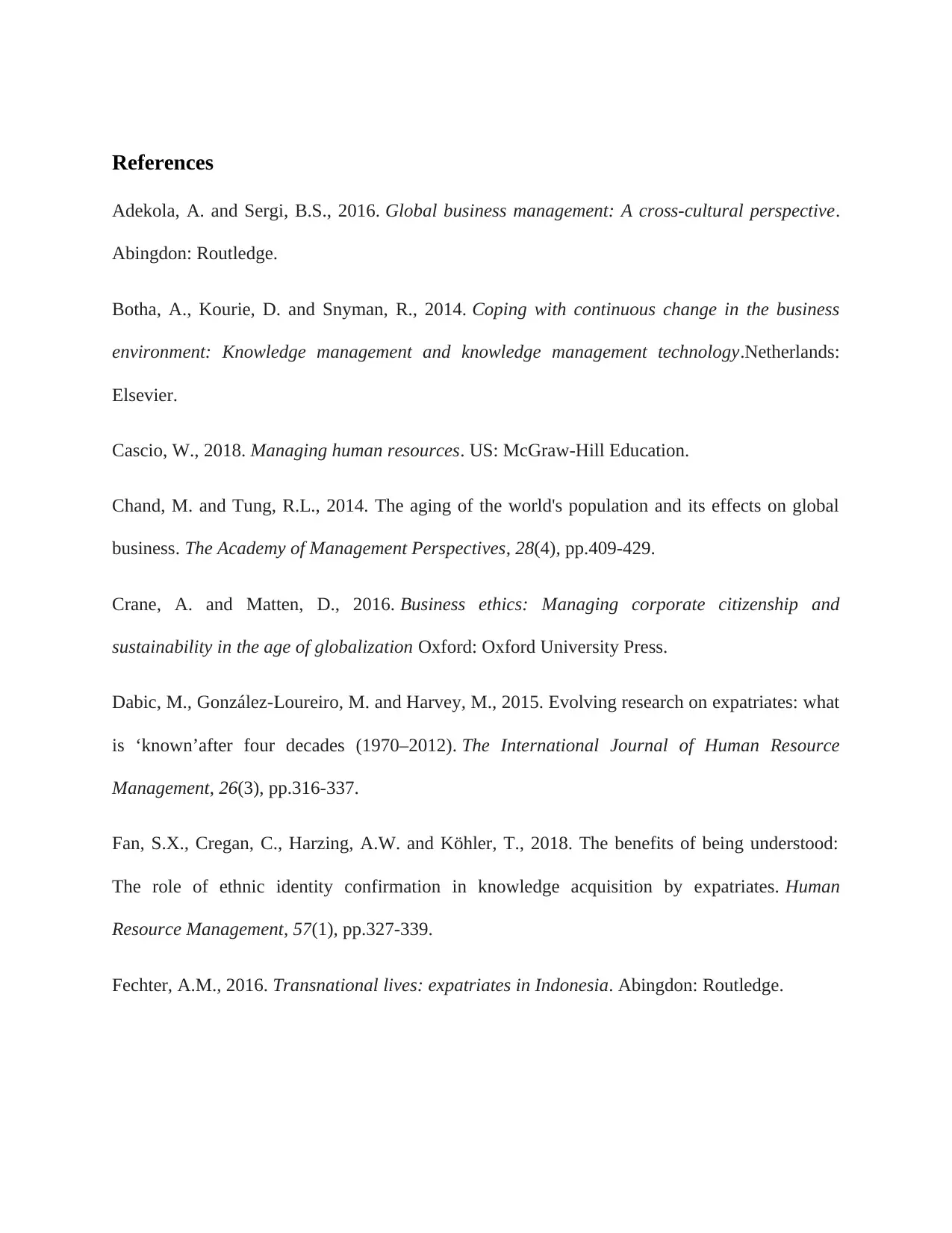
References
Adekola, A. and Sergi, B.S., 2016. Global business management: A cross-cultural perspective.
Abingdon: Routledge.
Botha, A., Kourie, D. and Snyman, R., 2014. Coping with continuous change in the business
environment: Knowledge management and knowledge management technology.Netherlands:
Elsevier.
Cascio, W., 2018. Managing human resources. US: McGraw-Hill Education.
Chand, M. and Tung, R.L., 2014. The aging of the world's population and its effects on global
business. The Academy of Management Perspectives, 28(4), pp.409-429.
Crane, A. and Matten, D., 2016. Business ethics: Managing corporate citizenship and
sustainability in the age of globalization Oxford: Oxford University Press.
Dabic, M., González-Loureiro, M. and Harvey, M., 2015. Evolving research on expatriates: what
is ‘known’after four decades (1970–2012). The International Journal of Human Resource
Management, 26(3), pp.316-337.
Fan, S.X., Cregan, C., Harzing, A.W. and Köhler, T., 2018. The benefits of being understood:
The role of ethnic identity confirmation in knowledge acquisition by expatriates. Human
Resource Management, 57(1), pp.327-339.
Fechter, A.M., 2016. Transnational lives: expatriates in Indonesia. Abingdon: Routledge.
Adekola, A. and Sergi, B.S., 2016. Global business management: A cross-cultural perspective.
Abingdon: Routledge.
Botha, A., Kourie, D. and Snyman, R., 2014. Coping with continuous change in the business
environment: Knowledge management and knowledge management technology.Netherlands:
Elsevier.
Cascio, W., 2018. Managing human resources. US: McGraw-Hill Education.
Chand, M. and Tung, R.L., 2014. The aging of the world's population and its effects on global
business. The Academy of Management Perspectives, 28(4), pp.409-429.
Crane, A. and Matten, D., 2016. Business ethics: Managing corporate citizenship and
sustainability in the age of globalization Oxford: Oxford University Press.
Dabic, M., González-Loureiro, M. and Harvey, M., 2015. Evolving research on expatriates: what
is ‘known’after four decades (1970–2012). The International Journal of Human Resource
Management, 26(3), pp.316-337.
Fan, S.X., Cregan, C., Harzing, A.W. and Köhler, T., 2018. The benefits of being understood:
The role of ethnic identity confirmation in knowledge acquisition by expatriates. Human
Resource Management, 57(1), pp.327-339.
Fechter, A.M., 2016. Transnational lives: expatriates in Indonesia. Abingdon: Routledge.
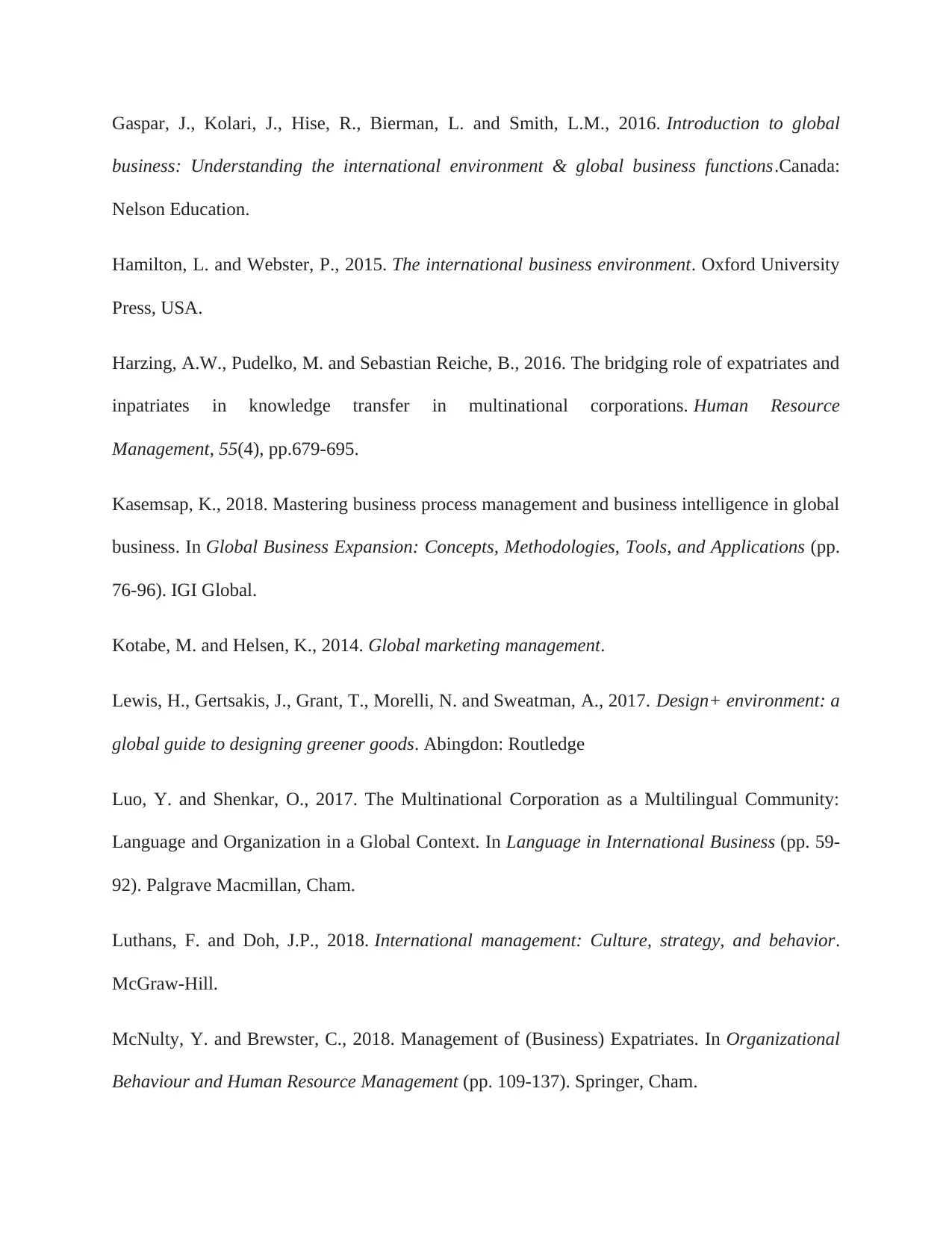
Gaspar, J., Kolari, J., Hise, R., Bierman, L. and Smith, L.M., 2016. Introduction to global
business: Understanding the international environment & global business functions.Canada:
Nelson Education.
Hamilton, L. and Webster, P., 2015. The international business environment. Oxford University
Press, USA.
Harzing, A.W., Pudelko, M. and Sebastian Reiche, B., 2016. The bridging role of expatriates and
inpatriates in knowledge transfer in multinational corporations. Human Resource
Management, 55(4), pp.679-695.
Kasemsap, K., 2018. Mastering business process management and business intelligence in global
business. In Global Business Expansion: Concepts, Methodologies, Tools, and Applications (pp.
76-96). IGI Global.
Kotabe, M. and Helsen, K., 2014. Global marketing management.
Lewis, H., Gertsakis, J., Grant, T., Morelli, N. and Sweatman, A., 2017. Design+ environment: a
global guide to designing greener goods. Abingdon: Routledge
Luo, Y. and Shenkar, O., 2017. The Multinational Corporation as a Multilingual Community:
Language and Organization in a Global Context. In Language in International Business (pp. 59-
92). Palgrave Macmillan, Cham.
Luthans, F. and Doh, J.P., 2018. International management: Culture, strategy, and behavior.
McGraw-Hill.
McNulty, Y. and Brewster, C., 2018. Management of (Business) Expatriates. In Organizational
Behaviour and Human Resource Management (pp. 109-137). Springer, Cham.
business: Understanding the international environment & global business functions.Canada:
Nelson Education.
Hamilton, L. and Webster, P., 2015. The international business environment. Oxford University
Press, USA.
Harzing, A.W., Pudelko, M. and Sebastian Reiche, B., 2016. The bridging role of expatriates and
inpatriates in knowledge transfer in multinational corporations. Human Resource
Management, 55(4), pp.679-695.
Kasemsap, K., 2018. Mastering business process management and business intelligence in global
business. In Global Business Expansion: Concepts, Methodologies, Tools, and Applications (pp.
76-96). IGI Global.
Kotabe, M. and Helsen, K., 2014. Global marketing management.
Lewis, H., Gertsakis, J., Grant, T., Morelli, N. and Sweatman, A., 2017. Design+ environment: a
global guide to designing greener goods. Abingdon: Routledge
Luo, Y. and Shenkar, O., 2017. The Multinational Corporation as a Multilingual Community:
Language and Organization in a Global Context. In Language in International Business (pp. 59-
92). Palgrave Macmillan, Cham.
Luthans, F. and Doh, J.P., 2018. International management: Culture, strategy, and behavior.
McGraw-Hill.
McNulty, Y. and Brewster, C., 2018. Management of (Business) Expatriates. In Organizational
Behaviour and Human Resource Management (pp. 109-137). Springer, Cham.
⊘ This is a preview!⊘
Do you want full access?
Subscribe today to unlock all pages.

Trusted by 1+ million students worldwide
1 out of 13
Related Documents
Your All-in-One AI-Powered Toolkit for Academic Success.
+13062052269
info@desklib.com
Available 24*7 on WhatsApp / Email
![[object Object]](/_next/static/media/star-bottom.7253800d.svg)
Unlock your academic potential
Copyright © 2020–2025 A2Z Services. All Rights Reserved. Developed and managed by ZUCOL.


